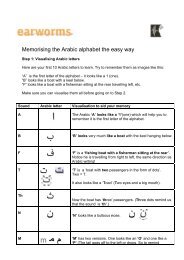Japanese Volume 2 with original hiragana - Earworms
Japanese Volume 2 with original hiragana - Earworms
Japanese Volume 2 with original hiragana - Earworms
You also want an ePaper? Increase the reach of your titles
YUMPU automatically turns print PDFs into web optimized ePapers that Google loves.
<strong>Japanese</strong> <strong>Volume</strong> 2 <strong>with</strong> <strong>original</strong> <strong>hiragana</strong><br />
1. On business or for sightseeing? (Inflight conversation)<br />
Are you going to Osaka on business<br />
or for sightseeing?<br />
(Osaka to - on business - or -<br />
sightseeing - ?)**<br />
Osaka made - shingoto - desu ka?<br />
- soretomo - kanko - desu ka?<br />
<br />
<br />
<br />
<br />
business shingoto <br />
or soretomo <br />
for sightseeing kanko <br />
On business but I’m also meeting<br />
friends.<br />
(On business - it is - but - friends -<br />
also - am meet-ing.)<br />
Shigoto - desu - ga - tomodachi -<br />
ni mo - ai - masu.<br />
but - friends - also - am meet-ing ga - tomodachi - ni mo - ai - masu <br />
<br />
<br />
<br />
<br />
<br />
Stewardess:<br />
Excuse me - kindly,… Sumimasen - dôzo <br />
...turn off you mobile, please.<br />
…keitai wo - keshite - kudasai. <br />
(…the mobile - turn off - please.)<br />
...fasten your seatbelt.<br />
...beluto wo - shimete - kudasai. <br />
(...the seatbelt - fasten - please.)<br />
Excuse me, could I have a brandy,<br />
please.<br />
Sumimasen, bulandê - wo kudesai. <br />
<br />
Excuse me, could I have a brandy, Sumimasen, bulandê - wo onengai <br />
please.<br />
shimasu. <br />
Could I please have ...<br />
... wo kudasai / ... wo onengai<br />
<br />
shimasu <br />
Could I get a brandy?<br />
Bulandê - wo mottekite - itadake <br />
masu ka? <br />
Could / can I get...?<br />
(Lit.: Can I have brought and get...?)<br />
...wo mottekite – itadake masu ka? <br />
<br />
Could I get - a wine? Wain wo - mottekite itadake masu ka? <br />
<br />
Could I get - a juice? Jûsu wo - mottekite itadake masu ka? <br />
<br />
Yes, - of course. - Immediate-ly. Hai - mochiron. - Sungu-ni. - - - <br />
So, here you are. Here is (your)<br />
brandy.<br />
Hai, dôzo. Bulandê desu.<br />
<br />
2. Are you from Japan?<br />
Are you from Japan?<br />
Nihon - no - kata - desu ka? <br />
(Japan - from* - person - is it?)<br />
Are you from Britain? Eikoku no kata - desu ka?
from America Amelika no kata <br />
I'm Japan-ese. Nihon-jin desu. <br />
I’m American. Amelika jin desu. <br />
British Eikoku jin <br />
Canadian Kanada jin <br />
Australian Ôsutolalia jin <br />
New Zealander Nujilando jin <br />
...but I’m living in America.<br />
(...but - America in - liv-ing.)<br />
liv-ing, work-ing, wait-ing<br />
Is Osaka your hometown?<br />
(As for Osaka - is hometown?)<br />
...demo - Amerikan ni - sunde -<br />
imasu.<br />
<br />
<br />
sunde-imasu, hataraite-imasu, matteimasu<br />
<br />
<br />
Osaka wa - kokyô desu - ka? <br />
<br />
hometown Kokyô <br />
No.<br />
Ii e. <br />
Which is your hometown?<br />
Kokyô wa - dochira desu ka? <br />
(Regarding hometown - which is it?)<br />
which Dochira <br />
As for (my) hometown - it is Kyoto. Kokyô wa - Kyoto desu. <br />
A beautiful - town - it is. Kirei na - machi - desu. <br />
beautiful<br />
kirei na <br />
Yes, that's right. Hai, sono tôri desu. <br />
Have a pleasant stay / Enjoy the stay.<br />
(The stay - do enjoy, - please.)<br />
Taizai wo - o tanoshimi - kudasai. <br />
<br />
Have a nice weekend. / Enjoy the Shu-matsu wo - o tanoshimi - <br />
weekend.<br />
kudasai. <br />
(The weekend - do enjoy, - please.)<br />
<br />
weekend shu-matsu <br />
3. Nice to meet you again (A look at the past tense)<br />
Hallo, nice to meet you again.<br />
(Hello, again we have met, haven't<br />
we?)<br />
Konnichiwa, mata ai mashita, ne?<br />
<br />
<br />
again - have met mata - ai mashita <br />
I’m (John) Smith. How do you do? Sumisu desu. Hajime mashite. <br />
Glad to meet you. Yoroshiku. <br />
How are you?<br />
O genki desu ka? <br />
(How is your health?)<br />
Fine, thanks. And (as for) you? Genki desu. Anata wa? <br />
Fine, very well. Genki. <br />
Welcome to Japan. Nihon e yokoso. <br />
welcome yokoso <br />
How was the journey?<br />
Ryokô wa dô deshita ka?<br />
<br />
(As to the journey - how - was it?)<br />
How - was it?<br />
Dô - deshita ka? Or alternatively:<br />
Ikanga - deshita ka?<br />
<br />
<br />
How - is it? / How was it?<br />
Dô - desu ka? / Dô - deshita ka?<br />
<br />
<br />
It was fine. (past form) Yo-katta desu. <br />
It was pleasant. Tanoshi-katta desu. <br />
<br />
It is pleasant / It was pleasant<br />
Tanoshii desu. / Tanoshi-katta desu.
At what time - did you leave? Nanji ni - demashita ka? <br />
At what time - do you leave? Nanji ni - demasu ka? <br />
...do you leave? / ...did you leave? ...demasu ka? / ...demashita ka? <br />
Tomorrow - at what time - do you Ashita - nanji ni - demasu ka? <br />
leave?<br />
<br />
I leave at 4.<br />
Yo-ji ni - demasu.<br />
<br />
(4 o’clock at - leave.)<br />
I left at 4.<br />
(4 o’clock at - left.)<br />
Yo-ji ni - demashita.<br />
<br />
4. Future plans<br />
What's the plan?<br />
Yotei wa, nan desu ka?<br />
<br />
(Regarding the plan, what is it?)<br />
Firstly I will accompany you to the<br />
hotel.<br />
(Firstly - hotel to - accompany -<br />
Mazu - hotelu e - go-issho - shimasu. <br />
<br />
will do.)<br />
firstly mazu <br />
to the hotel hotelu e <br />
accompany you go-issho <br />
will do shimasu <br />
I will pick you up at 7p.m.<br />
(At 7 o'clock - pick up - will do.)<br />
Shichi-ji ni - pikku appu - shimasu. <br />
<br />
OK, I will wait for you in the lobby.<br />
(OK, - in lobby - wait - will.)<br />
Ok. - lobbî de - o machi shimasu. <br />
<br />
wait machi <br />
wait for you o machi <br />
will wait for you...<br />
o machi shimasu...<br />
<br />
(wait for you - will)<br />
...in the lobby.<br />
...lobbî de.<br />
<br />
(...lobby at/in. )<br />
Then where are we going (to)?<br />
(Then - where to - going?)<br />
Sore-de wa - doko e - iki masu ka? <br />
<br />
Then... Sore-de wa... <br />
...where to doko e <br />
...go/going? ...iki masu ka? <br />
We’re going to my favorite restaurant. Watashi no - sukina - restoran - e <br />
(My - favourite - restaurant - to - - iki masu.<br />
(we are) going)<br />
<br />
going Iki masu <br />
I look forward to - doing that. Tanoshimi ni - shite masu <br />
I’m looking forward to the party. Pâtii wo tanoshimi ni shite masu. <br />
<br />
I’m looking forward to the trip. Ryoko wo tanoshimi ni shite masu. <br />
<br />
I’m looking forward to the meal. Shokuji wo tanoshimi ni shite masu. <br />
<br />
<br />
<br />
5. I have reserved... <br />
<br />
Welcome. Irasshai mase.
Good day, Jones is the name. I have<br />
reserved a room.<br />
Konichiwa, Jones desu. Heya wo<br />
yoyaku shimashita.<br />
<br />
<br />
Jones is the name. Jones desu. <br />
I have reserved a room.<br />
Heya wo - yoyaku shimashita. <br />
(A room - have reserved.)<br />
For one person, isn’t it? O hitori desu, ne? <br />
1 person, 2 persons, 3 persons, 4 hitori, futari, san nin, yon nin<br />
<br />
persons<br />
For 3 nights, isn't it? San (3) paku desu, ne? <br />
How about 4 nights? Yonpaku wa dô desu ka? <br />
How about…? … wa dô desu ka? <br />
Yes, that’s fine. Hai, yoroshi desu. <br />
Could you show your passport,<br />
please?<br />
(The passport - show - could you,<br />
please?)<br />
Ryoken wo - o mise, - kudasai? <br />
<br />
Yes, here you are. Hai, dôzo. <br />
How are you paying - credit card or<br />
cash?<br />
(As to the payment - credit card or<br />
cash?)<br />
Oshiharai wa - kurejitto kâdo desu<br />
ka, casshu desu ka?<br />
<br />
<br />
By credit card, please. Kurejitto kâdo de, onengai shimasu. <br />
<br />
by de <br />
I don’t need breakfast.<br />
Choshoku wa irimasen.<br />
<br />
(As for breakfast - don’t need.)<br />
need / don’t need irimasu / irimasen <br />
Here is the key. Hai, kagi desu. <br />
It’s number 202.<br />
Ni hyaku ni - gô - desu.<br />
<br />
(202 - number - it is.)<br />
Just one more thing, - is there Chotto summimasen - heya ni - <br />
internet in the room?<br />
interneto - arimasu ka?<br />
(Just excuse - room in - internet -<br />
<br />
is there?)<br />
Yes, there is. Hai, gozaimasu. <br />
6. More numbers<br />
100 hyaku 1000 sen <br />
200 ni-hyaku 2000 ni-sen <br />
300 san-byaku 3000 san-zen <br />
400 yon-hyaku 4000 yon-sen <br />
500 go-hyaku 5000 go-sen <br />
600 rop-hyaku 6000 roku-sen <br />
700 nana-hyaku 7000 nana-sen <br />
800 hap-pyaku 8000 has-sen <br />
900 kyu-hyaku 9000 kyu-sen <br />
That’s very cheap! Sore wa tottemo yasui desu! <br />
Now write down this telephone<br />
number:<br />
Zelo, zelo, hachi, ichi, - yon, ni, go, -<br />
kyu, ichi, roku, ni, zero, san.
Excuse me, could you repeat?<br />
Summimasen, kuri kaeshite kudasai<br />
masuka?<br />
<br />
<br />
<br />
7. Booking a room<br />
Good morning. Ohayo gozaimasu. <br />
Welcome. Irasshai mase. <br />
Is a room available?<br />
Heya ga - ai-te masu ka?<br />
<br />
(A room - available is?)<br />
…is available / free? ...ai-te masu ka? <br />
For how many people?<br />
Nan nin-sama - desu ka?<br />
<br />
(How many people - are there?)<br />
(For) one person. Hitori desu. <br />
For how many nights?<br />
Nan - paku - desu ka?<br />
<br />
(How many - nights - is it?)<br />
(For) 3 - nights. San - paku desu. <br />
Is there - a bath? Ofuro wa - arimasu ka? <br />
Yes, of course. Hai, mochiron desu. <br />
Smokers or non-smokers?<br />
Sumôkâ desu ka non sumôkâ desu<br />
ka?<br />
<br />
<br />
How much is it? Ikura desu ka? <br />
It's 15000 yen. Ichi man go-sen en desu. <br />
<br />
Is that including breakfast?<br />
(Breakfast - including - is that?)<br />
Chôshoku - komi - desu ka? <br />
<br />
No, the breakfast is 1,200 Yen per Iie,chôshoku wa - hitori - sen ni <br />
person.<br />
hyaku (1,200) en desu.<br />
<br />
(No, as for breakfast - one person -<br />
<br />
1,200 yen - is.)<br />
It’s a buffet. (Viking style) Baikingu desu. <br />
Yes, that's okay. Hai, ii desu. <br />
May I have your credit card?<br />
(The credit card - may I get?)<br />
Kurejitto kâdo wo - itadakemasu ka? <br />
<br />
May I get / have....? ...wo itadakemasu ka? <br />
Excuse me, just one more thing. Is<br />
there an elevator?<br />
Chotto summimasen, elebêtâ wa<br />
arimasu ka?<br />
<br />
<br />
Yes, there is, over there.<br />
Hai, achira ni - gozaimasu*.<br />
<br />
(Yes, over there - there is.)<br />
over there achira ni <br />
there (nearer) sochira ni <br />
8. Personal details<br />
Please, fill this form.<br />
(This form - in - fill, - please.)<br />
Kono yôshi - ni - kinyû, - wo<br />
onengai shimasu.<br />
<br />
<br />
This form... Kono yôshi... <br />
fill in ni - kinyû
(in - fill)<br />
..., please. ...wo onengai shimasu. <br />
Your name and address, please.<br />
O* namae to go jûsho, wo onengai<br />
shimasu.<br />
<br />
<br />
What’s your name? O namae wa? <br />
What’s your address? Go jûsho wa? <br />
Nationality Kokuseki <br />
Passport no. Ryoken bangô <br />
Profession Shokungyô <br />
What’s your profession? Go* shokungyô wa? <br />
Married / not maried Ki-kon / mi-kon <br />
Age Nen rei <br />
Year Nen <br />
Place of birth<br />
shussei-chi<br />
<br />
(Birth place)<br />
Date of birth<br />
Sei - nen - gap - pi<br />
<br />
(Birth - year - month - date)<br />
Signiture Sain (sign) <br />
<br />
Months<br />
<br />
<br />
<br />
9. At the restaurant<br />
We (have) reserved seats for 7<br />
o'clock.<br />
(Seats - 7 o’clock for - reserved -<br />
have.)<br />
Seki wo - shichi ji ni - yoyaku -<br />
shimashita.<br />
<br />
Waiter: In what name? Weitâ: O namae wa? <br />
Please, this way.<br />
Dôzo, kochira e.<br />
<br />
(Please, this to.)<br />
Here is the menu. Menyu o dôzo. <br />
Ok, thanks. Hai, dômo. <br />
What are you having? (familiar form, Nani - ni shimasu ka?<br />
<br />
spoken to a friend)<br />
(What - will you have?)<br />
Firstly, I'll take a beer.<br />
Mazu, bilu - ni shimasu.<br />
<br />
(Firstly, a beer - I’ll take.)<br />
I’ll have a sake.<br />
O-sake - ni shimasu.<br />
<br />
(A sake - I’ll have.)<br />
I’ll take / have... ...ni shimasu. <br />
What kind of beer is there? Don na bilu ga, arimasu ka? <br />
What kind of...? Don na...? <br />
There is Asahi beer. Asahi bilu ga arimasu. <br />
The waiter says: There is also Kirin<br />
beer.<br />
(Kirin beer also there is)<br />
Kirin bilu mo gozaimasu.<br />
<br />
Sakana ga ii desu ka? Niku ga ii desu<br />
Do you prefer fish or meat?<br />
ka?<br />
(Fish is good? Meat is good?)<br />
<br />
<br />
fish - meat sakana - niku <br />
Fish is good. Sakana ga ii desu. <br />
I’ll take the sashimi set meal.<br />
(Raw fish set meal - I’ll take.)<br />
Sashimi teishoku - ni shimasu. <br />
Sashimi wa - suki desu ka?<br />
<br />
Do you like raw fish?<br />
(As for raw fish - like it?)
Yes, I like it very much.<br />
Hai, dai suki desu.<br />
<br />
(Yes, very much like it.)<br />
I’ll take the salmon in teriyaki sauce Watashi wa - sake no teriyaki <br />
set meal.<br />
teishoku - ni shimasu.<br />
(As for me - salmon in teriyaki<br />
<br />
(sauce) set meal - I’ll take.)<br />
Bon appetit! Itedakimasu! <br />
This teriyaki sauce is delicious. Kono teriyaki wa tottemo oishii desu.<br />
<br />
<br />
<br />
10. What’s your job? (An informal chat)<br />
What's your job?<br />
O shigoto wa - nan desu ka? <br />
(As for your work - is what?)<br />
I work at a bank.<br />
Ginko de - hataraite-imasu.<br />
<br />
(Bank at - work-ing.)<br />
Since when (how long) are you Soko-de - itsu kara - hataraiteimasu<br />
<br />
working there?<br />
(There-at - when from - are you<br />
work-ing?)<br />
ka?<br />
...since when...?<br />
...itsu kara...?<br />
<br />
(...when - from...?)<br />
20 years. Nijû (20) nen desu. <br />
Really? Honto? <br />
How old are you? Ikutsu desu ka? <br />
I'm 42 years (old). Yonjû-ni sai desu. <br />
By the way, do you have a family?<br />
(By the way, as for a family - do you<br />
have?)<br />
My family is living in Osaka.<br />
(My family - in Osaka - is living.)<br />
elder brother, elder sister<br />
younger brother, younger sister<br />
Tokoro de, go kazoku wa - arimasu<br />
ka?<br />
<br />
<br />
your - family anata no - kazoku <br />
Watashi no kazoku wa - Osaka ni -<br />
sunde imasu.<br />
ani, ane<br />
otouto, imouto<br />
<br />
<br />
<br />
<br />
husband, wife otto, tsuma <br />
child, children kodomo, kodomo-tachi <br />
a son, a daughter musuko, musume <br />
Any plans for tomorrow? Ashita no yotei wa? <br />
Shall we meet? Ai-mashô ka? <br />
OK, let’s meet. Ok,ai-mashô. <br />
Where at and at what time - shall we Doko de, nan-ji ni - aimashô ka ? <br />
meet?<br />
Is at 9.30 - OK?<br />
Ku ji han (9.30) de - ii desu ka? <br />
(9.30 at - OK?)<br />
In front of the Sony Building - how Sony bilu no mae wa - do desu ka? <br />
about it?<br />
in front of …no mae <br />
I look forward to - doing that. Tanoshimi ni - shite imasu. <br />
*********









